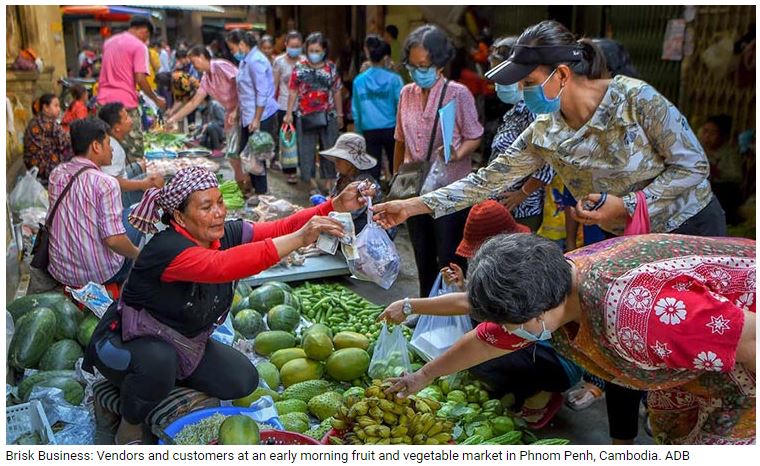ADB focuses on health, clean energy, roads in Cambodia
The Asian Development Bank committed $25 million to strengthen Kingdom’s health system. The funding will enhance laboratory services and infection prevention control at 81 provincial and district referral hospitals across the country
The Asian Development Bank (ADB) published its annual report, highlighting its operations and financial results in 2021.
In the report, ADB also provided details of its various projects and programs in Cambodia last year.
To tackle the Covid-19 pandemic in Southeast Asia last year, ADB said it made strategic investments to reinforce national health systems, services, and programs to provide greater protection for vulnerable populations in times of crisis.
In Cambodia, ADB committed $25 million for a project to strengthen the country’s health system. The bank noted that the funding will enhance laboratory services and infection prevention control at 81 provincial and district referral hospitals.
Under the same project, ADB has been administering a $5 million grant from the Japan Fund for Prosperous and Resilient Asia and the Pacific (JFPR) to improve emergency care at 14 provincial hospitals. The grant will fund new equipment and train health staff on identifying and supporting people affected by gender-based violence and mental health issues.
Last year, the bank also supported the private sector in scaling up clean energy infrastructure. In the Kingdom, ADB provided a $4.7 million non-sovereign loan to Prime Road Alternative Company Ltd. to develop and operate a 60-megawatt solar power plant in Kampong Chhnang Province. The project is expected to reduce greenhouse gas emissions by nearly 111,000 tonnes a year.
The bank said it continued to tackle urban challenges across Southeast Asia, including investments to improve solid waste management, expand safe water supply and sanitation, and decongest road network choke points.
In Cambodia, ADB committed $180 million so that around 140,000 residents living in Bavet, Kampot, and Poipet can benefit from better wastewater and solid waste management services. “The project will also help reduce flooding in the cities by upgrading urban stormwater and drainage systems. The project includes a grant of $2 million from the JFPR to develop municipal government capacity in urban and infrastructure planning,” the bank said in the annual report.
It pointed out that the rural and remote communities across Southeast Asia have often found themselves cut off from medical and other critical services during the Covid-19 pandemic. To address this issue and support the longer-term recovery in the region, ADB has been investing in improvements to road connectivity and access to markets for millions of rural residents.
The bank committed $82.1 million in Cambodia to make 48 km of national and provincial roads less susceptible to damage caused by climate change, natural hazards, and vehicle overload. The bank said this investment would better connect about 2.5 million people in the provinces of Prey Veng and Kandal to markets and income-earning opportunities. The project, which is along the Greater Mekong Subregion (GMS) Southern Economic Corridor, will also expand access to education, health, and other public services for remote communities.
ADB pointed out that its support for strengthening governance and institutional capacity in Southeast Asia is highlighted by three significant investments in 2021. In Cambodia, the bank committed a $40 million policy-based loan to expand access to credit for micro, small, and medium-sized enterprises and support reforms to boost financial stability and upgrade finance sector infrastructure. ADB said it is also supporting upgrades to outdated payment systems through the program.
ADB has also been working to intensify integration between countries in Southeast Asia to help accelerate the region’s green and inclusive recovery from the Covid-19 pandemic.
Regionally, ADB provided technical assistance to promote the competitive, efficient, and seamless movement of goods in Southeast Asia. It said the project would build the capacity of customs administrators in Cambodia and the Lao People’s Democratic Republic to implement select provisions of the World Trade Organization Trade Facilitation Agreement. It will also help the two DMCs strengthen their engagement with the private sector.
ADB said its knowledge work on agriculture and rural development included events on mapping rice plots and crop yields amid lockdowns in Cambodia, on policy responses to ensure food security in the wake of the COVID-19 pandemic, and promoting better nutrition post-pandemic.
The bank also provided regional technical assistance to assess the impacts of the pandemic on food and nutrition security and rural livelihoods across Asia and the Pacific and to help DMCs mobilise investments for a greener and resilient recovery of agri-food value chains and rural economies, the report added.
Source: https://www.khmertimeskh.com/501063773/adb-focuses-on-health-clean-energy-roads-in-cambodia/


 English
English




